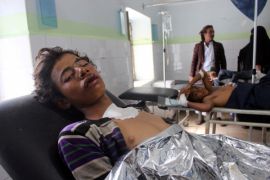"Twelve of the Ansar al-Sharia (Supporters of Islamic Sharia Law) terrorists were killed and three wounded after Artillery Brigade 119 targeted a group planting explosive devices on the main road," he said.
Two soldiers were later killed and three wounded when the gunmen attacked a military base, the officer told AFP, adding that the clashes took place overnight.
A medical source said a 13th gunmen was also killed.
Hundreds of men who officials say are connected to Al-Qaeda took control of Zinjibar on May 29 after battles with the army in which 140 people died, including about 80 soldiers.
But opponents of President Ali Abdullah Saleh accuse his government of exaggerating a jihadist threat to head off Western pressure on his 33-year rule.
Yemen is the home of Al-Qaeda in the Arabian Peninsula, an affiliate of the slain Osama bin Laden`s militant network. The group is accused of anti-US plots including an attempt to blow up a US-bound aircraft on Christmas Day, 2009.
In a separate development, two soldiers were killed on Sunday in the restive southern region of Lahij, a local official told AFP, adding that they were gunned down by gunmen close to groups seeking the secession of the south.
"Gunmen opened fire on a military truck... killing the driver and a passenger. Both were soldiers," the official said.
Earlier this month, a local official said that three Yemeni soldiers and two southern militants were killed in a gunfight when militants of the Southern Movement attacked an army checkpoint in Lahij province.
The Southern Movement is an umbrella group of southern factions whose demands range from social and political equality to total secession from the north.
Many residents of south Yemen, which was independent from 1967 when the British withdrew until it was united with the north in 1990, complain of discrimination by the Sanaa government in the distribution of resources.
The south seceded in 1994, sparking a brief civil war that ended with the region being overrun by northern troops. (*)
Editor: Kunto Wibisono
Copyright © ANTARA 2011










